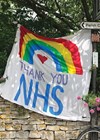“At a cardiac arrest, the first procedure is to take your own pulse”
The quote above is the Fat Man’s third law from the book The House of God by Samuel Shem, previously described in the ‘Doctor by the sea’ article [1]. As a reminder, this satirical novel follows a group of medical interns as they navigate their traumatic hospital residency training.
A senior resident known as the Fat Man, who acts as their guide and mentor, creates a set of laws for the residents to follow so that they are able to not only successfully manage their patients but also survive psychologically. In this law, he was essentially explaining to the interns that it is important to remain calm in the stressful situations which can arise in medicine. Unfortunately, training for this was not included in the curriculum when I was at medical school. Graduating and starting out on the wards was essentially a trial by fire.

On my first day as a houseman in August 1995, at the district general hospital, I arranged to meet the outgoing houseman on my firm (a medical team comprising a consultant and a small group of junior doctors) for a brief handover at the entrance. He handed the pager over to me with a big smile on his face, shook my hand and then said, “Good luck.” I cheerfully replied, “Thank you!”, and proceeded to skip happily into the building feeling terribly important. At the time I thought he was just being really warm and friendly. However, I quickly worked out that he was just delighted to be escaping the busy firm and getting rid of the pager which would become a device of torture for me over the next six months.
He was well aware that I was going to be the next in a long line of lambs to the slaughter. Also, I should have realised our exchange of “Good luck” followed by “Thank you” was ominous, given the fact that the same quote happens in the movie The Great Escape (1963). When escaping from the prison camp Stalag Luft III, Squadron Leader Roger Bartlett and Flight Lieutenant Andy MacDonald get caught out with the crafty ‘English-speaking’ trick by a suspicious Gestapo agent, checking their papers on climbing aboard a bus to potential freedom. They were subsequently caught and shot.
The on-call rota, where different small teams of doctors take turns in covering the hospital medical duties outside normal working hours, had already been prepared in advance before we started. As usual, I drew the short straw. My team was given the first weekend on call to cover all the hospital medical wards and receive all the new acute medical patient admissions. I believe that weekend was the most unpleasant and busiest weekend of my career. This is because not only did I have all the usual duties to contend with but I was also responsible for acting as the phlebotomist, taking the blood samples for the wards all weekend.
The problem with doing the first weekend of the six-month block is that all the other housemen were just as fresh and inexperienced as me. Therefore, on the Friday afternoon, shortly before escaping for the weekend, my fellow junior colleagues filled out blood test request forms for the weekend on all their patients. Not wanting to be accused of managing their patients poorly, they asked for almost every conceivable blood test on everyone for both the Saturday and Sunday. Fortunately, the registrar who I was on call with became aware of my plight early on the Sunday morning. He came to my rescue by filing half of the unnecessary blood request slips in the bin. Despite this I still had an onerous task and if I wasn’t proficient at phlebotomy at the start of the weekend, I was by the end [2].
For my first ever on call that weekend, my senior house officer explained to me that there were three different types of page or ‘bleep’ that I could potentially receive.
The first was a normal page, the response to which was to phone the extension displayed promptly. The second was a fast page, which was an alert that a patient was critically unwell but had not arrested, the response to which was to run as fast as possible to the ward to attend to them. The last was an arrest page, which involved dropping everything and sprinting to the location where the patient was in cardiac arrest.
The normal page was obviously the least stressful one and was usually a request to carry out a task on the ward such as writing up a drug on a prescription chart. And not all pages were medically related – if the number displayed for the extension to phone was prefixed by a ‘1’, then this indicated to the recipient that the page was a social / friendly one to organise something like a trip to the pub after work.
I am not sure what was worse, choosing between the fast or the arrest page. The fast page only went out to the most junior member of the team, which was me. This was ironic as it was to carry out the complicated task of assessing and managing an acutely unwell patient, usually imminently about to arrest. Often, I had no prior knowledge of the patient’s medical history which made the task even more challenging. This was a very stressful situation because the patient and nurses’ expectations were obviously high and if I could not manage on my own, the cavalry in the form of the senior house officer was often at the other end of the hospital.
The arrest page was fraught for a different reason. Although all members of the medical team and the on-call anaesthetist were called to a cardiac arrest and there was an algorithm to follow, I was always worried that I would be the first one to arrive. Being the most junior member of the team, I found cardiac arrests quite intimidating. There was also the emotional trauma of managing a patient in cardiac arrest at the cusp of life, where survival rates are very low. Even now only about 25% patients in hospital survive a cardiac arrest to discharge [3]. In fact, during the whole six months, I only recall one successful cardiac arrest outcome on a patient who was on the coronary care unit. During the winter, when admission rates were high with an elderly local population, I witnessed a lot of cardiac arrests and deaths.
Sleep deprivation is a well-known form of torture and has been used as such for centuries. I would regularly return to my on-call room in the small hours, lie down fully clothed still wearing my white coat, drift off to sleep for a few minutes only to be paged back to the wards again. I don’t think I ever achieved the all-important brain recovery rapid eye movement (REM) sleep on call. After work one day in the depths of winter, post on call having been awake for 32 hours, I went back to my room and just went straight to bed. Later on, the phone rang in my room which was still in darkness. I asked my friend at the other end of the line what time it was. He said, “7:45.” I replied, “Is that morning or evening?” A good example of how fatigued and disorientated I was at the time [4].
Understandably, after the trials of that period, I realised that acute medicine was not the specialty for me. I was fortunate subsequently to be able to enter into the world of ophthalmology. However, I still had to take part in the on-call rota. This time though it was only for eye emergencies.
“When the patient goes to sleep, the eye goes to sleep,” my registrar explained to me in my first week in ophthalmology in Glasgow, reassuring me that the ophthalmology on calls were not very busy in the middle of the night. This was true to some extent. However, the only problem was that in Glasgow, sometimes the potential patients didn’t bother going to sleep. I would regularly be woken up by an A&E doctor about a trauma victim from a late-night fight to come and attend to. I often found myself trying to stitch eyelid lacerations back together on an inebriated patient in the small hours who would frequently be rolling around on the trolley shouting out expletive laden comments such as, “What are you ******* doing?” And “******* leave me alone!” The surprisingly good cosmetic results seen in the outpatient clinic a couple of weeks later were a testament to how remarkably effective and forgiving the eyelids are at healing, rather than any advanced oculoplastic surgical skills that I had at the time.
The philosophy of some of the ophthalmology consultants towards the juniors on the on-call rota at the time was, “Don’t hesitate to cope,” if there was a problem. As a result, they were very rarely contacted on call. Fortunately, the registrars I worked with were usually very experienced. Any call to the consultant usually had to go through the registrar anyway so they could take the potential flack.
One of the bonuses about being on call as a trainee in ophthalmology is that you did not need to be resident at the hospital but could go home at night. However, it made it all the more frustrating if you were actually called in, especially if it was for something as mundane as changing a catheter or re-siting an intravenous cannula. Gently swearing under my breath at the start of the journey to the hospital in the car, having just scraped ice off the windscreen, gradually transformed into the reassuring and calming mantra of “at least I’m not on call for medicine” by the time I arrived.
“There goes the fear,” the band, Doves, once sang, but I’m not sure the fear ever goes when being on call. Lying in bed with a pager and latterly a mobile phone next to my head on the pillow, waiting for it to go off like an unexploded bomb. The dread of being woken up from sleep to be faced with something that I could not manage on my own. As a trainee I carried the Wills Hospital Eye Manual with me on call for many years as some kind of talismanic protection from whatever I might be confronted with. Transitioning to a consultant, with the prospect of no one else to turn to for advice, only compounded the fear.
Over the course of a career in medicine there will be unpleasant experiences when working on call. Alongside the many cardiac arrests in my early years of training, bad events I have witnessed include a patient who exsanguinated in front of me by haematemesis from oesophageal varices, a young man who castrated himself and a teenager who was stabbed in the eye with a kitchen knife so forcefully that it penetrated his frontal lobe. All of these episodes were disturbing and cannot be unseen.
Returning to the Fat Man’s third law regarding cardiac arrest, I would agree with it. However, I would add an additional law, which is: “After a cardiac arrest, or indeed any bad experience on call, be kind to yourself.” As doctors we tend to internalise our emotions for many reasons, including a need to appear stoical and a fear of being judged. However, doing so can lead to both mental and physical health problems and also difficulties forming and maintaining healthy relationships. Therefore, my advice is try not to be consumed by the negative emotions from these bad experiences. Debriefing with friends and colleagues is essential for wellbeing and also take time out to do something you enjoy. Don’t hold on to the stress, keeping it inside you, as it will only lead to an earlier arrival at your own arrest. While the memories of unpleasant events cannot be erased, the impact of their trauma can be managed. As Bob Hoskins said in the British Telecom advert from the 1990s, “It’s good to talk.”
Finally, always remember, even in the darkest hours of an on call, as Shakespeare writes in Macbeth, “Come what come may, time and the hour runs through the roughest day” [5,6].
References
1. Cackett P. Pete’s Bogus Journey: Doctor by the sea (Pete’s Hidden Curriculum Part 1). Eye News 2022;28(5):46.
2. For many years after my initial introduction on the wards, on meeting a patient for the first time, I would assess the arm and how easy it would be to take blood and put an IV cannula in. Subsequently in ophthalmology, the first thing I started to assess as the patient sat down was the anatomy of the orbit and judge how easy it would be access the cataract during any potential surgery, obviously fearing the dreaded deep-set eye.
3. Andersen LW, Holmberg MJ, Berg KM, et al. In-Hospital Cardiac Arrest: A Review. JAMA 2019;321(12):1200–10.
4. For anyone that would like to see a reasonably accurate and realistic account of what it was like as a junior doctor working in the NHS in the early 1990s, watch the Jed Mercurio television series, Cardiac Arrest (1994–6). At the time, the confident medical senior house officer Claire Maitland (Helen Baxendale) was the doctor we all aspired to be.
5. This line is spoken by Macbeth in Act 1, Scene 3 of Shakespeare’s play, Macbeth. Macbeth has just heard about the prophecies of the witches and is contemplating his fate. The phrase suggests that even during the most difficult experiences, time will continue to pass, and things will eventually change.
6. These sentiments from Macbeth are also summed up in an old Persian adage این نیز بگذرد – “This too shall pass.” This is probably the best mantra of all when on call.










